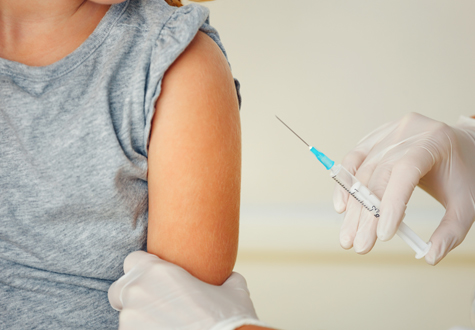Which vaccines are important for your preteen and when should they get them? Get the answers to these vaccination questions and more. This article also appears in the March 2016 issue of Cville Family magazine.
By their preteen and teen years, girls and boys grow out of a lot of things — baby dolls and toy trains are likely stored away. But one thing they don’t outgrow is vaccinations.
Several vaccines are recommended for preteens and teens, according to the U.S. Centers for Disease Control and Prevention. As kids get older, protection from some childhood vaccines begins to wear off and some vaccines work better when given during adolescence.
What You Need to Know
Here’s what parents need to know, according to the experts of the Teen and Young Adult Health Center at UVA Children’s Hospital.
Today’s vaccinations are very safe and effective. Don’t let misinformation (all too common on the Internet) keep you from giving your child the best protection against serious, even life-threatening, diseases.
Every year, kids (and parents) should get a flu shot. At your child’s 11- or 12-year-old checkup, he or she is ready for the Tdap, meningococcal and HPV vaccines. These three shots protect against:
- Tetanus, diphtheria, and pertussis (whooping cough) — The latter can be spread to babies, which can be very dangerous. There have been recent outbreaks of pertussis in our community.
- Meningococcal disease — Meningitis is a serious infection around the brain and spinal cord, and most common among teens and college students in close contact.
- HPV (human papillomavirus) infections — HPV is a common virus that causes cervical cancer in women, as well as genital warts, and mouth and throat cancers in both men and women.
Questions About Vaccines?
The experts at the UVA Teen and Young Adult Health Center welcome your questions.
At the 11- or 12-year-old visit, your teen should also catch up on any missed childhood vaccines. It is safe to receive all recommended vaccines on the same day. Before you leave the office, schedule an appointment to be sure your adolescent gets the next HPV vaccine (it requires three doses). After your child’s sweet 16 birthday, he or she will need a second meningococcal vaccine.
Truth About the HPV Vaccine
Adolescents who get the HPV shot often say they’ve heard from classmates that “it’s the one that hurts,” notes April Garrison, RN, of the UVA Teen and Young Adult Health Center. But, she adds, most kids feel pain for only a few seconds, followed by a day or two of soreness in the arm.
Since 2006, more than 80 million HPV doses have been given in the U.S. Like other vaccines, the HPV vaccine has been carefully studied. No serious safety concerns or long-term side effects have been identified, says the CDC. Still, this doesn’t keep unreliable sources — and unsuspecting parents — from sharing scary information through social media. Here’s the truth: the HPV vaccination has the potential to prevent nearly 3 out of 4 cancers caused by persistent HPV infections.
If your older teen or even college-aged son or daughter missed out when they were younger, don’t worry. They can get protected against HPV up until the age of 26.
